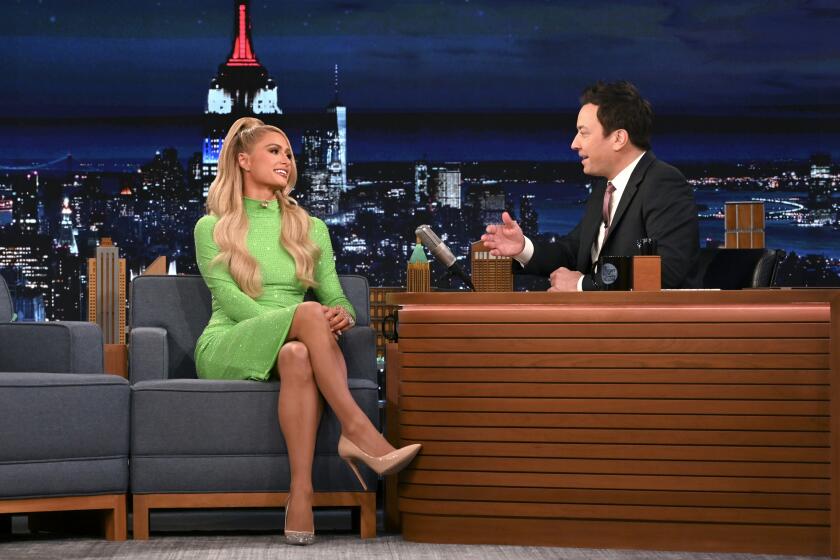Et tu, Larry? Why so many celebrities are shilling for crypto

- Share via
The crypto economy got the red-carpet treatment at Super Bowl LVI.
The biggest cryptocurrency exchanges, looking to demystify their businesses for tens of millions of Americans, secured commercials during the big game, which cost up to $7 million per 30-second spot. Some enlisted famous faces.
Larry David appeared as a clueless time traveler who turns up his nose at great innovations (The wheel? Eh. The lightbulb? “Can I be honest? ... It stinks.”) before pooh-poohing a pitch for crypto company FTX. The tagline: “Don’t be like Larry. Don’t miss out on the next big thing.” Later, LeBron James schooled his younger self about taking chances in an ad for Crypto.com.
It was widely anticipated that big names would back crypto and non-fungible tokens, or NFTs, during the big game. So much so that ahead of the match, cryptocurrency trading platform Binance dropped videos featuring the Miami Heat’s Jimmy Butler and music artist J. Balvin warning viewers against celebrity crypto endorsements.
“On Feb. 13, you’re going to hear some of the biggest names telling you to get into crypto,” Butler said. “But they don’t know you or your finances. Only you do.”
The star-studded ads were the latest example of the entertainment industry’s growing interest in everything blockchain. In the past year, there’s been a preponderance of actors, musicians and athletes talking up digital currencies and NFTs — unique digital records authenticating ownership of an item, tracked on a digital ledger.
Still trying to figure out why anyone would pay thousands of dollars for a digital image that can be freely copied? Here’s a primer on NFTs.
Movie studios are auctioning off crypto collectibles to promote new films. Musicians are releasing songs, albums and memorabilia as tokens, giving fans access to bonus material. Theme park designers are talking about bringing famous characters and fantasy worlds into the metaverse. DJs are planning totally virtual concerts and parties.
And of course, there are the celebrity crypto endorsements. Last year Matt Damon appeared in a Crypto.com ad comparing electronic currency investment to nautical exploration and space travel, with the slogan “Fortune favors the brave.” Paris Hilton showed off her Bored Ape Yacht Club NFT on “The Tonight Show Starring Jimmy Fallon.” Reese Witherspoon has touted crypto assets on Twitter. “In the (near) future, every person will have a parallel digital identity,” the “Big Little Lies” star tweeted in January.
Critics have balked at the spectacle of the rich and famous encouraging viewers to gamble on a risky and speculative market that has been plagued by grifters. Skeptics say the cryptocurrency and NFT craze has primarily benefited wealthy early adopters — the true believers — who could afford to get in early.
Analysts see clear parallels in the crypto space to the dot-com bubble. That earlier hype cycle reached a pop culture apex at the 2000 Super Bowl. That game featured ads by companies like Pets.com, which quickly collapsed.
“My problem is, when 98% of these NFTs will go bust in the next couple of years, it will just crush a lot of the small investors,” said Anindya Ghose, a professor at New York University’s Stern School of Business. “If you’re Matt Damon or Paris Hilton, you can afford to lose 5% of the net worth. But for many small retail investors, 5% or 10% of your net worth is a nontrivial loss.”
In using his huge platform to promote a digital asset he owns, Jimmy Fallon invited uncomfortable questions about the role of celebrity influence in the NFT craze.
A-listers repping brands and products is nothing new, of course. But selling crypto and NFTs is more awkward than pitching for typical consumer goods, because the concepts are still foreign to many consumers. It’s not quite the same as pitching for potato chips and energy drinks, said Columbia Business School professor R.A. Farrokhnia.
“How are you going to explain non-fungible tokens in a way that’s understandable and portrays some of the risks attached to it?” Farrokhnia asked.
Broad skepticism hasn’t stopped ambitious artists from experimenting in the growing crypto universe.
DJ and producer Steve Aoki, one of the most vocal proponents of NFTs and the possibilities of blockchain technologies in entertainment, has set up an online platform dubbed A0K1VERSE for holders of Steve Aoki NFTs.
He describes the project as a digital version of a membership-based social club, like Soho House, with different tiers of experiences, including access to collectibles, concert tickets and virtual performances. At a certain membership level, fans could collaborate with him on music, he said.
“I call it the preseason,” Aoki said. “There’s a lot of different ways to think about where we’re going. The exciting part now, for creators like myself, is that we can actually start building the architecture.”
Entertainers and companies are trying to learn and prepare for a future when audiences live more of their lives in virtual worlds, said Adam Friedman, an executive at Creative Artists Agency.
“We’re well past the notion of anything in the space being a cash grab,” Friedman said. “It’s about what makes the most sense strategically for the client, their business and their brand.”
Some in the industry think there’s potential to mine NFTs for movie and TV show ideas, treating them as intellectual property, similar to comic books, video games and toy lines. Last year, CAA signed Jenkins the Valet, a digital character created by Tally Labs, for representation in books, film, TV and podcasts.
“At the end of the day, it’s IP, and if the IP is compelling, and clients and the market find it compelling, there’s a lot of opportunity,” Friedman said.
Kat Graham, an actress and artist who makes music under the name Toro Gato, released her latest album exclusively as a series of NFTs. Graham said she sees the format as a way to circumvent an exploitative record label system.
Graham worked with the NFT marketplace YellowHeart, which helped the rock band Kings of Leon release an NFT version of its record in one of the first major uses of the format by a mainstream artist.
Graham said selling NFT albums gives her a more direct connection to fans than streaming, which smaller artists have despised for years because of paltry royalties.
“It feels like we have our own club, like we have our own community,” she said. “I hope that this space will open up more artists.”
NFTs started to pick up steam during the COVID-19 pandemic amid the rise in popularity of physical collectibles, such as baseball cards, as alternative investments.
But the newness and volatility of the crypto economy has made it a hotbed for swindlers and intellectual property theft. Early this month, a website called HitPiece allegedly auctioned off music NFTs without artists’ permission, infuriating musicians and leading the Recording Industry Assn. of America to call the platform “little more than a scam operation.”
A class action lawsuit last month accused Kim Kardashian and Floyd Mayweather of artificially pumping up the price of the cryptocurrency EthereumMax. The coin lost about 97% of its value in seven months, leading critics to call it a “pump and dump” hustle.
The Department of Justice this month charged a married couple — one of whom moonlighted as a YouTube rapper — in a $4.5-billion crypto money-laundering scheme.
Such incidents have damaged the sector’s reputation with the general public. Some believers recognize the issues but see them as a natural part of a work in progress.
“There’s going to be bubbles, there’s going to be bad actors, there’s going to be scams,” said Jeremy S. Goldman, a Los Angeles-based partner at law firm Frankfurt Kurnit Klein & Selz who specializes in blockchain issues. “But that doesn’t negate the fact that underlying this is an incredible new innovation that has the ability to bring tremendous value to new creators and to existing creators.”
Studios have tried to clamp down on artists selling NFT versions of their work featuring Marvel and DC superheroes. Miramax sued Quentin Tarantino for planning to auction images of his handwritten “Pulp Fiction” script. Tarantino’s lawyers argued that the director had the right to sell the pages as NFTs under his original contract.
José Delbo, an 87-year-old comic artist, sold more than $1 million worth of Wonder Woman NFTs. Sales like his got the attention of DC Comics and Marvel. The debate over NFT winners and losers.
Meanwhile, movie studios and TV networks are dipping their toes in with their own NFTs. (Disclosure: The Los Angeles Times is selling its own NFTs.)
Warner Bros. has issued tokens based on its “Matrix” and “Space Jam” franchises ahead of new film releases. AMC Networks enlisted NFT production company Orange Comet to issue computer-animated “Walking Dead” clips as tokens. And Sony Pictures and AMC Theatres created “Spider-Man” NFTs for members of AMC’s movie ticket subscription program and investors.
To promote “Ghostbusters: Afterlife,” Sony Pictures auctioned 10 “Ghostbusters” vignettes as NFTs on the OpenSea marketplace leading up to the release. The Culver City studio also issued thousands of digital collectible Mini-Pufts (tiny Stay-Puft marshmallow characters) to appeal to the more everyday consumer.
“We’re in a phase where you have these crypto whales and these people that understand the technology that are buying these, but there’s not a lot of those people,” said Jamie Stevens, Sony Pictures’ head of consumer products and licensing. “So we really wanted to create an opportunity for our fans to be able to own a piece of it.”
Some studios also see an opportunity to take what they’ve done in physical theme-park attractions and bring that into the digital world.
Jenefer Brown, who runs live and location-based entertainment for Santa Monica film and TV studio Lionsgate, envisions a world where fans can enter the world of the “John Wick” action franchise and book a room at the Continental Hotel, the action series’ neutral refuge for the criminal underworld.
“We’ve dusted off concepts that we’ve come up with, from a physical standpoint, that just couldn’t be built for a variety of reasons, that absolutely could be built in a digital environment,” Brown said.
Buying NFTs is complicated, and experts predict that more consumers will embrace it only as the technology becomes easier to use and understand.
Right now, the market is frothy with capital pouring in, and many analysts expect it to contract. However, the technology itself is not going anywhere. “NFTs are here to stay,” Goldman said. “They’re just going to evolve, as technology always does.”
More to Read
Inside the business of entertainment
The Wide Shot brings you news, analysis and insights on everything from streaming wars to production — and what it all means for the future.
You may occasionally receive promotional content from the Los Angeles Times.












